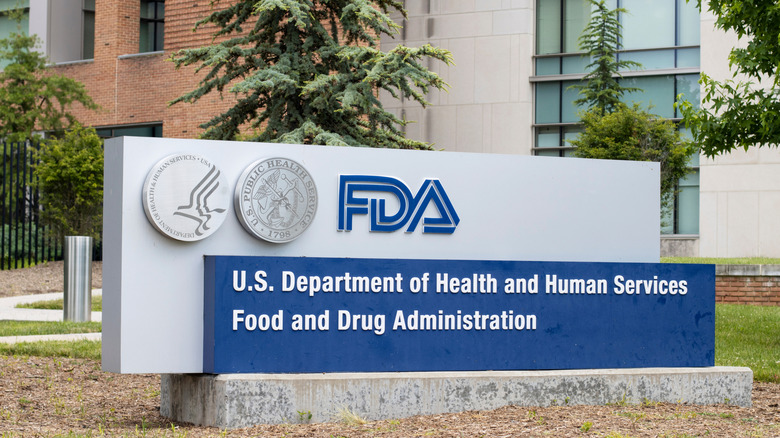The First Major US Food Recall Pulled Millions Of Cans Off The Shelves
These days, food recalls can be disappointing and even anxiety-inducing depending on the reason. But the fact that recalls exist in the first place is a good thing. They mean that someone, somewhere found an error or a hazard and wants the least amount of consumers to be affected by it. Still, there was a time when food recalls didn't exist, or were very rare. The first major food recall didn't occur until January 1973.
The recall originated at United Canning in Ohio when it was discovered that some of the mushroom cans were in a bloated state. Swollen cans can be dangerous as they could contain a rare toxin called Clostridium botulinum which can cause the illness, botulism. Botulism can be life-threatening, potentially impacting the nervous system and causing respiratory failure. Symptoms can appear anywhere from four hours to eight days after exposure.
Thankfully, the Food and Drug Administration took the swollen can situation seriously and put a recall on the mushrooms. As a result, 75 million cans of mushrooms were stripped from grocery store shelves. While they maybe didn't have the same culinary cachet as meaty chicken of the woods mushrooms, the loss of millions of canned mushrooms caused devastation to many — particularly business owners. When the recall was put out, some mushrooms had already been sent to restaurants where they sat in a state of limbo; not in the can, but not yet consumed. The dramatic discarding of these potentially contaminated fungi is what led to the Great Michigan Pizza Funeral.
The Great Michigan Pizza Funeral
When news of the canned mushroom recall reached Papa Fabbrini's Frozen Pizzas, Mario Fabbrini had his restaurant's mushrooms tested for contamination. Mushroom pizza was fed to laboratory mice which died after consumption. Fabbrini had no choice but to cut his losses. Today we can get a chuckle from pizza cereal, but back in the '70s, pizza was highly coveted and the loss was tragic. To ditch the bad stock, Fabbrini gathered all the remaining mushroom pizzas and gave them a proper send-off with a pizza "funeral."
On March 2, 1973, Fabbrini filed a lawsuit against the United Canning Corporation and Tolona Pizza Product Corporation for negligence. And on March 5, he and a crowd watched as roughly 30,000 frozen, family-sized mushroom pizzas slid out of dump trucks to be buried.
The pizzas — resting in peace at the bottom of an 18-foot hole — were covered with dirt by bulldozers, as guests in mourning were served non-contaminated pizza. A wreath of red and white flowers was placed on the grave to represent the sauce and cheese of a classic pizza. Unfortunately for the pizza that was buried that day, the mushrooms in the recall were not the cause of death for the lab mice, meaning Fabbrini could have spared his mushroom pies the burial.
How do food recalls happen?
While there have been no other notable pizza funerals since Mario Fabbrini's macabre mushroom display, recalls have continued for the safety of consumers. Recalls happen when foods don't meet regulations set by the U.S. Food and Drug Administration (FDA). There are several reasons for food to be recalled, including contamination by toxins, bacteria, or parasites. A mislabelled product can also trigger a recall due to allergy alerts caused by undeclared contact with common allergens like milk or nuts (Undeclared dairy in Hammond's Mini Waffle Cones once led to a recall).
Human error can also be a catalyst. Food that might have come into contact with glass or other small, dangerous contaminants can get recalled in order to prevent injury or illness. While many recalls are released as public warnings and quickly spread by word of mouth, the FDA also offers a recall subscription service where consumers can request notifications of all recalls — or of specifically selected recalls. Food recalls may be the last thing anyone wants to hear about in regard to their groceries, but these measures ensure safety for consumers and accountability for manufacturers.


